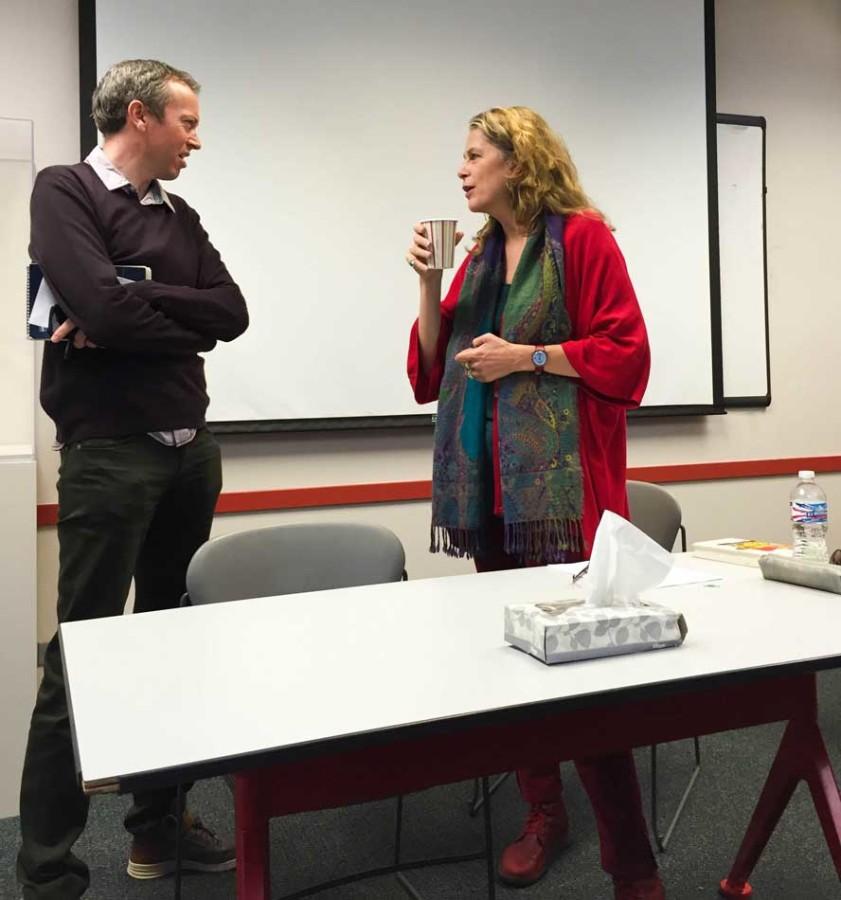Ex-BBC correspondent Lara Pawson speaks at Northwestern
David Fishman/ The Daily Northwestern
Former BBC correspondent Lara Pawson spoke at the African Studies building Wednesday about her new book. “In the Name of the People: Angola’s Forgotten Massacre” chronicles the events of May 27, 1977, which left thousands of people dead.
October 7, 2015
Former BBC correspondent Lara Pawson spoke at Northwestern on Wednesday about “In the Name of the People” — her new book on the day thousands of Angolans died.
The “purge,” as Pawson calls the Angolan killings on May 27, 1977, remained hidden for years, due to lack of official sources and a government-imposed news blackout.
Some say the ruling party — the Popular Movement for the Liberation of Angola — was responding to an attempted coup, Pawson said. Others assert the MPLA overreacted to a protest, she added.
“Through this book, I have sought to fuzzy, complicate and interrupt what I believe have been overly dogmatic and elitist approaches to understanding (Angola),” she told an audience of roughly 25 people.
Pawson began her career as a journalist for the BBC, reporting on the Angolan civil war from 1998 to 2000, she said. After that, she wrote intermittently for various news outlets, but eventually became “disillusioned” by the media and “abandoned ship.” In 2014, Pawson published her first book, a detailed narrative on the “vinte e sete,” a Portuguese term Angolans use to refer to the date of the killings.
Political science Prof. Will Reno, director of African Studies, said he invited Pawson to speak at Northwestern after she reached out to him about her book.
“People who have been in the world of journalism are good speakers because they’ve learned how to craft their message,” he said.
Reno said he considers himself an expert on Angola, but was unaware about “vinte e sete” before Pawson spoke.
“When I look at Lara Pawson’s work and the bigger picture, it has impact,” Reno said. “People who are responsible for these sorts of things in the past suddenly discover they have a problem. (Lara) is part of that process.”
Eugene Gogol, 73, a self-described Marxist-humanist, also said he had never heard of the “vinte e sete” before coming to the speech.
“I thought it was a tremendously serious and important story to get out,” said Gogol, who lives in Mexico City and found the event online. “People have to understand the contradictions within revolutionary processes, because if we don’t resolve them we’re never going to get a new human society.”
What actually happened on May 27, 1977, is still up for debate. Pawson’s book, though extensive, fails to uncover the truth, she said. Instead, she concluded that truth is not an absolute, but rather a set of conflicting narratives, none more valid than the other.
“I’m not sure that the pursuit of truth is very helpful in life,” she told The Daily. “How do we ever know what the truth is?”
Email: davidpkfishman@u.northwestern.edu
Twitter: @davidpkfishman


